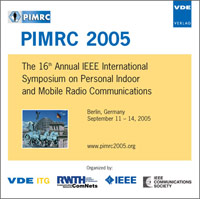Performance Analysis of Selective Space-time Coding and Selection Diversity under Perfect and Imperfect CSI
Conference: PIMRC 2005 - 16th Annual IEEE International Symposium on Personal Indoor and Mobile Radio Communications
09/11/2005 - 09/14/2005 at Berlin, Germany
Proceedings: PIMRC 2005
Pages: 5Language: englishTyp: PDF
Personal VDE Members are entitled to a 10% discount on this title
Authors:
Pan, Ya-Han (Nanjing Telecommunication Technology Institute, Nanjing 210007, Jiangsu Province, China)
Pan, Ya-Han; Aïssa, Sonia (INRS-EMT, University of Quebec, Montreal, QC, H5A 1K6, Canada)
Abstract:
MIMO systems can provide significant increases in capacity and bandwidth efficiency as well as improvement in the QoS in wireless communications. However, multiple RF chains connected to multiple antennas are usually more expensive and complex than antenna elements themselves. Selective space-time coding and selection diversity can be viewed as practical means to reduce the implementation complexity of MIMO systems while still taking benefit of the use of multiple antennas. In this paper, we evaluate the performance of selective space-time block coding and antenna selection diversity and analyze the performance of both schemes under perfect and imperfect channel state information (CSI) available at both ends of the transmission link. Our performance analysis reveals that, under perfect CSI, selective space-time coding diversity yields a loss in selection diversity gains when combined with space-time coding, and that selecting just a single antenna at the transmitter side to transmit data is the best strategy in this CSI case of operation. We also show that selection diversity still outperforms selective space-time coding diversity when the channel estimation is imperfect.


